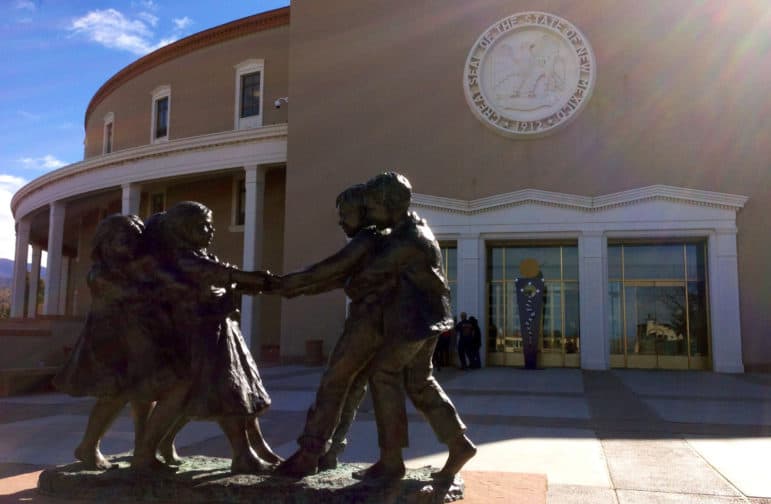
Heath Haussamen / NMPolitics.net
A statue outside the Roundhouse in Santa Fe.
COMMENTARY: The Center for Public Integrity and Global Integrity earlier this month gave New Mexico a letter grade of D- in its 2015 State Integrity investigation, calling the state “ethically challenged on a variety of fronts.”
Correcting New Mexico’s culture of corruption requires public employees and everyday citizens to take it upon themselves to report suspected wrongdoing in every level of government. Fortunately, laws passed in the last five years protect and even reward whistleblowers for taking a stand against fraud and abuse.

Courtesy photo
Paul Gessing
In 2015, the New Mexico Legislature unanimously passed and Gov. Susana Martinez signed an update to the Fraud Against Taxpayers Act to include “political subdivisions,” like school districts, hospital districts, municipalities and counties. The Fraud Against Taxpayers Act enables New Mexico’s attorney general to pursue civil penalties against people who defraud or conspire to defraud local or state government.
So as to make taxpayers whole for the misuse of public funds, a person found to have committed fraud under the statute can be liable for three times the damages sustained by the state or political subdivision and a civil penalty of up to $10,000.
How to report fraud
Reporting fraud against taxpayers can be done a couple of ways.
First, a person with knowledge of wrongdoing can report it directly to the Attorney General’s Office, whose Litigation Division works confidentially with whistleblowers who identify fraud and, according to the statute, “shall diligently investigate suspected violations.”
The attorney general can also delegate investigations and litigation to other agencies, such as the political subdivision. If a person is found to have “violated or is violating that section, the attorney general may bring a civil action against that person pursuant to the Fraud Against Taxpayers Act.”
Another way a whistleblower can seek justice for taxpayers is to file a lawsuit in district court “in the name of the state or political subdivision,” according to the statute. The filed complaint and evidence must also be served to the Attorney General’s Office on the same day. The attorney general then has 60 days to notify the court of whether the state will intervene and proceed with a civil action or decline to litigate.
In an instance where the attorney takes up and wins a case filed by a whistleblower, the law provides that the whistleblower will receive “at least 15 percent but not more than 25 percent of the proceeds of the action or settlement,” depending on the whistleblower’s contributions to the case, as well as “an amount for reasonable expenses incurred in the action, plus reasonable attorney fees that shall be paid by the defendant.”
The bill sponsor of this year’s update adding political subdivisions to the Fraud Against Taxpayers Act, Senate Minority Whip Bill Payne of Albuquerque, said in an Albuquerque Journal story fraud would be discouraged in local government if officials knew employees and others were being encouraged to report wrongdoing.
The following is how to contact the attorney general regarding the Fraud Against Taxpayers Act:
Office of the Attorney General
Litigation Division
Galisteo Street
Santa Fe, NM 87504
(505) 827-6000
Whistleblower protection
Public employees at every level of an organization’s hierarchy have the right and the responsibility to ensure government is lawful and proper in its activities. If they see something, they should say something, without fear of retaliation. In that spirit, the Legislature overwhelmingly passed the Whistleblower Protection Act in 2010.
Under the statute, a public employer shall not take any retaliatory action against a public employee who provides information or testifies “about an action or a failure to act that the public employee believes in good faith” was unlawful or improper, or “refuses to participate in an activity, policy or practice that constitutes an unlawful or improper act.”
A public employee must file a lawsuit within two years of the date of the suspected retaliatory act, or else be “forever barred” from pursuing civil action. A public employer found to have violated the Whistleblower Protection Act “shall be liable to the public employee for actual damages, reinstatement with the same seniority status that the employee would have had but for the violation, two times the amount of back pay with interest on the back pay and compensation for any special damage sustained as a result of the violation,” as well as reasonable legal costs.
The civil action may be brought by the employee “in any court of competent jurisdiction.”
The bottom line
The bottom line is, every New Mexican is now protected and empowered to root out corruption. If public dollars are being misspent, misdirected or misused, do the right thing: Speak out for ethical, honest government.
Gessing is the president of New Mexico’s Rio Grande Foundation, an independent, non-partisan, tax-exempt research and educational organization dedicated to promoting prosperity for New Mexico based on principles of limited government, economic freedom and individual responsibility.